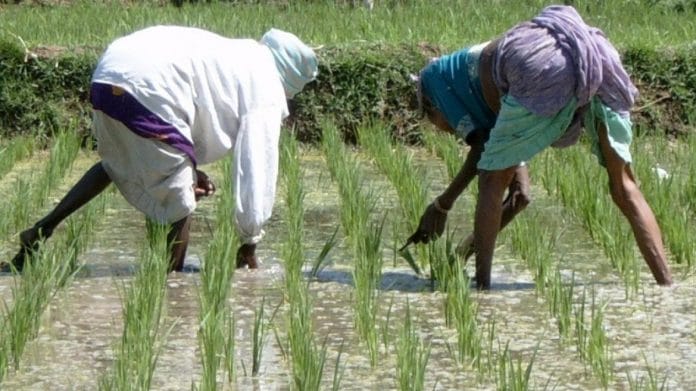New Delhi: Prime Minister Narendra Modi Tuesday officially launched the country’s first-ever non-GM (genetically modified) herbicide-tolerant rice varieties, which have been developed by the Indian Agricultural Research Institute (IARI).
The IARI promises that the rice varieties — ‘Pusa Basmati 1979’ and ‘Pusa Basmati 1985’ — will save massive labour as well as water input costs in rice cultivation.
According to IARI, these rice varieties have been developed by crossing over two existing popular varieties — Pusa 1121 and Pusa 1509 — with Robin, which, in turn, is a drought-tolerant rice variety derived from Nagina 22, another deep root, drought and heat-tolerant rice breed.
The new herbicide-tolerant varieties have, however, been developed through mutation breeding and not by genetic modification to ensure no foreign gene in the new varieties.
How new crops will save on water and labour
IARI claims the new rice varieties will save on labour and water input in rice cultivation compared to conventional transplanting varieties as they can be directly seeded.
This is because the new varieties will allow the direct application of herbicides such as Imazethapyr, which eradicate a range of weeds.
In conventional rice growing, herbicides are not directly applied as they can’t distinguish between the rice plant and weeds. Therefore, paddy seeds are first raised as young plants in nurseries before being planted in the fields some 25-35 days later.
This whole process is necessary because standing water in the nursery acts as a natural herbicide eliminating weeds.
But the process is a very water- and labour-intensive process as the young seedlings need to be maintained in standing water of up to 5 cm depth for almost a month. This requires massive labour work as the rice fields require watering every 2-3 days for the whole month along with puddling in the nursery.
According to IARI, with the new varieties being herbicide-tolerant, chemical application will destroy only weeds, thereby allowing farmers to sow paddy directly like other crops such as wheat.
Also read: Some festive cheer on edible oils front as prices dip, mustard oil is the only exception
ALS gene key
The IARI claims the new herbicide-tolerant varieties of rice contain a mutated acetolactate synthase (ALS) gene, which allows farmers to use Imazethapyr on rice crops, doing away with the need for massive water usage and maintaining rice crops at an early stage in flooded nurseries.
The ALS gene and resultant enzyme don’t bind with herbicides such Imazethapyr when sprayed on the crop thus continuing the growth of the plant while killing only weeds.
According to an estimate, under the current prevalent model of rice cultivation, transplantation in paddy takes 30 irrigations, each consuming some 5 hectare-cm water (one hectare-cm=1,00,000 litre). Direct seeding of rice, however, reduces water consumption by 30 per cent less and Rs 3,000/acre in transplantation labour charges along with 10-15 days fewer nursery time.
‘Will ensure higher yield’
Prime Minister Narendra Modi, while releasing the new varieties Tuesday, said they will also ensure higher yields.
“In the last 6-7 years, science and technology are being used on a priority basis to solve the challenges related to agriculture,” he said. “To protect the crops from diseases, new varieties of seeds were given to the farmers for higher yield.”
“Due to climate change, new types of pests, new diseases, epidemics are coming, due to this, there is a big threat to the health of humans and livestock and crops are also being affected. In-depth research is needed on these aspects,” he added.
“Also, it is now necessary to develop millets and other grains further with solutions from science and research. The purpose is that they can be grown in different parts of the country, according to different needs.”
The other crop varieties with special traits developed in 2021 and released by PM Modi, address challenges of climate change and malnutrition as they contain special traits like climate resilience and higher nutrient content. They include a drought-tolerant variety of chickpea, mosaic resistant pigeon pea, early maturing soybean, biofortified varieties of wheat, pearl millet, maize and chickpea and quinoa among others.
(Edited by Arun Prashanth)
Also read: Onion prices set to climb again in September-November, erratic monsoon to blame: Crisil report






